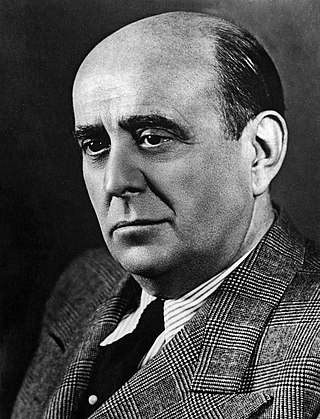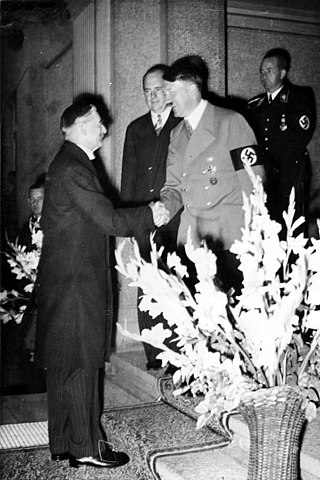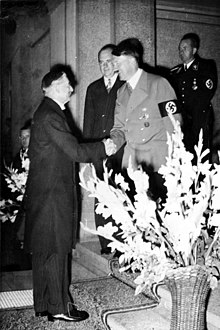
Arthur Neville Chamberlain was a British politician who served as Prime Minister of the United Kingdom from May 1937 to May 1940 and Leader of the Conservative Party from May 1937 to October 1940. He is best known for his foreign policy of appeasement, and in particular for his signing of the Munich Agreement on 30 September 1938, ceding the German-speaking Sudetenland region of Czechoslovakia to Nazi Germany led by Adolf Hitler. Following the invasion of Poland on 1 September 1939, which marked the beginning of the Second World War, Chamberlain announced the declaration of war on Germany two days later and led the United Kingdom through the first eight months of the war until his resignation as prime minister on 10 May 1940.

The Sudetenland is the historical German name for the northern, southern, and western areas of former Czechoslovakia which were inhabited primarily by Sudeten Germans. These German speakers had predominated in the border districts of Bohemia, Moravia, and Czech Silesia since the Middle Ages. Since the 9th century the Sudetenland had been an integral part of the Czech state both geographically and politically.

The Munich Agreement was an agreement reached in Munich on 30 September 1938, by Nazi Germany, Great Britain, the French Republic, and Fascist Italy. The agreement provided for the German annexation of part of Czechoslovakia called the Sudetenland, where more than three million people, mainly ethnic Germans, lived. The pact is also known in some areas as the Munich Betrayal, because of a previous 1924 alliance agreement and a 1925 military pact between France and the Czechoslovak Republic.

Jan Garrigue Masaryk was a Czech diplomat and politician who served as the Foreign Minister of Czechoslovakia from 1940 to 1948. American journalist John Gunther described Masaryk as "a brave, honest, turbulent, and impulsive man".

Appeasement, in an international context, is a diplomatic negotiation policy of making political, material, or territorial concessions to an aggressive power to avoid conflict. The term is most often applied to the foreign policy of the British governments of Prime Ministers Ramsay MacDonald, Stanley Baldwin and Neville Chamberlain towards Nazi Germany and Fascist Italy between 1935 and 1939. Under British pressure, appeasement of Nazism and Fascism also played a role in French foreign policy of the period but was always much less popular there than in the United Kingdom.
Fall Grün was a pre-World War II plan for the invasion of Czechoslovakia by Nazi Germany. Although some preliminary steps were taken to destabilise Czechoslovakia, the plan was never fully realised since Nazi Germany achieved its objective by diplomatic means at the Munich Conference in September 1938, followed by the unopposed military occupation of Bohemia and Moravia and the creation of a nominally independent Slovakia, in March 1939.

The military occupation of Czechoslovakia by Nazi Germany began with the German annexation of the Sudetenland in 1938, continued with the creation of the Protectorate of Bohemia and Moravia, and by the end of 1944 extended to all parts of Czechoslovakia.

Konrad Ernst Eduard Henlein was a Sudeten German politician in Czechoslovakia prior to World War II. After Germany invaded Czechoslovakia he became the Gauleiter and Reichsstatthalter of Reichsgau Sudetenland under the occupation of Nazi Germany.

The Sudetendeutsches Freikorps (SFK) was a paramilitary organization founded on 17 September 1938 in Germany on direct order of Adolf Hitler. The organization was composed mainly of ethnic German citizens of Czechoslovakia with pro-Nazi sympathies who were sheltered, trained and equipped by the German army and who conducted cross-border terrorist operations into Czechoslovak territory from 1938 to 1939. They played an important role in Hitler's successful effort to occupy Czechoslovakia and annex the region known as Sudetenland into the Third Reich under Nazi Germany.

German Bohemians, later known as Sudeten Germans, were ethnic Germans living in the Czech lands of the Bohemian Crown, which later became an integral part of Czechoslovakia. Before 1945, over three million German Bohemians constituted about 23% of the population of the whole country and about 29.5% of the population of Bohemia and Moravia. Ethnic Germans migrated into the Kingdom of Bohemia, an electoral territory of the Holy Roman Empire, from the 11th century, mostly in the border regions of what was later called the "Sudetenland", which was named after the Sudeten Mountains.

Sir Nevile Meyrick Henderson was a British diplomat who served as the ambassador of the United Kingdom to Germany from 1937 to 1939.

The Czechoslovak government-in-exile, sometimes styled officially as the Provisional Government of Czechoslovakia, was an informal title conferred upon the Czechoslovak National Liberation Committee, initially by British diplomatic recognition. The name came to be used by other Allied governments during the Second World War as they subsequently recognised it. The committee was originally created by the former Czechoslovak President, Edvard Beneš in Paris, France, in October 1939. Unsuccessful negotiations with France for diplomatic status, as well as the impending Nazi occupation of France, forced the committee to withdraw to London in 1940. The Czechoslovak Government-in-Exile offices were at various locations in London but mainly at a building called Fursecroft, Marylebone.
1938 (MCMXXXVIII) was a common year starting on Saturday of the Gregorian calendar, the 1938th year of the Common Era (CE) and Anno Domini (AD) designations, the 938th year of the 2nd millennium, the 38th year of the 20th century, and the 9th year of the 1930s decade.

Edvard Beneš was a Czech politician and statesman who served as the president of Czechoslovakia from 1935 to 1938, and again from 1939 to 1948. During the first six years of his second stint, he led the Czechoslovak government-in-exile during World War II.

The European foreign policy of the Chamberlain ministry from 1937 to 1940 was based on British Prime Minister Neville Chamberlain's commitment to "peace for our time" by pursuing a policy of appeasement and containment towards Nazi Germany and by increasing the strength of Britain's armed forces until, in September 1939, he delivered an ultimatum over the invasion of Poland, which was followed by a declaration of war against Germany.
Events in the year 1938 in Germany.
A Total and Unmitigated Defeat was a speech by Winston Churchill in the House of Commons at Westminster on Wednesday, 5 October 1938, the third day of the Munich Agreement debate. Signed five days earlier by Prime Minister Neville Chamberlain, the agreement met the demands of Nazi Germany in respect of the Czechoslovak region of Sudetenland.
The Runciman Mission to Czechoslovakia was an initiative of the British government initiative that was aimed at resolving an international crisis threatening to lead to war in Europe in the summer of 1938. The Mission, headed by a former British cabinet minister Lord Runciman, was sent to mediate in a dispute between the Government of Czechoslovakia and the Sudeten German Party (SdP), representing the country's mostly-radicalised ethnic German minority. The British mediators were active on the ground in Czechoslovakia during the late summer and issued their report shortly before the Munich Conference in September.
The following events occurred in September 1938:
The Carlsbad Programme was an eight-point series of demands, addressed to the government of Czechoslovakia, issued by Konrad Henlein, the leader of the Sudeten German Party (SdP), at a party gathering in Carlsbad on 24 April 1938.The programme demanded full autonomy for the mainly German-inhabited areas of Czechoslovakia, known as the Sudetenland. Under pressure from its allies, Britain and France, the Czechoslovak government reluctantly accepted the demands. But the SdP, instructed by Nazi Germany not to reach a settlement with the Czechoslovak authorities, broke off negotiations, thus precipitating the Munich crisis.













